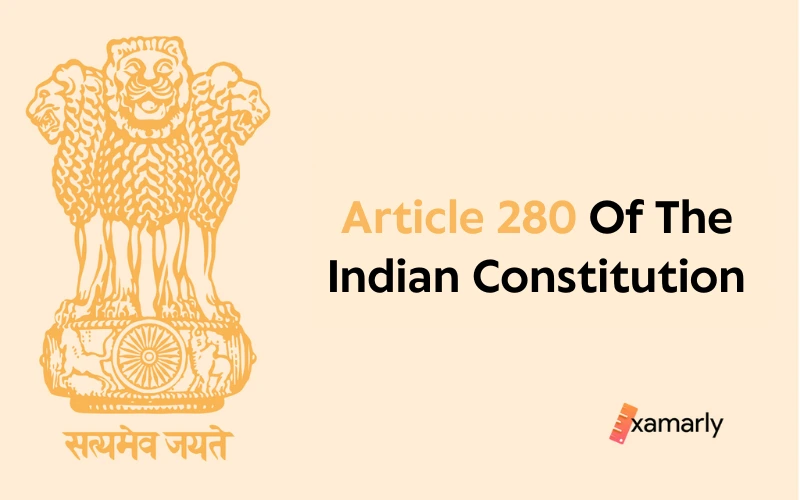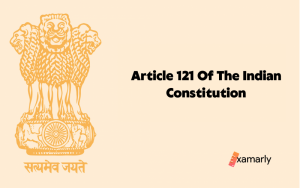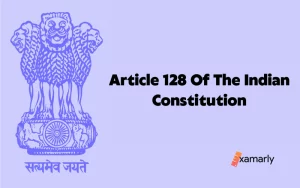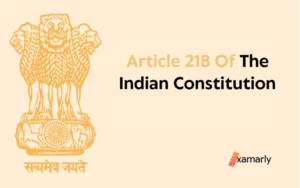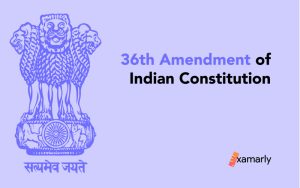An Overview
The Indian Constitution is a document that lays out the fundamental principles and laws of the country. One of the most important articles is Article 280 of the Indian Constitution, which deals with the Finance Commission of India. It is included in Part XII of Chapter I of the Constitution of India.
Article 280 of the Indian Constitution lays down the provisions for the creation of a Finance Commission and the powers and duties allotted to it.
In this blog post, we will take a closer look at Article 280 of the Indian Constitution and explore its significance and implications for the financial management of the country.
- An Overview
- Article 280 Of The Indian Constitution: Provision Related To The Finance Commission
- Background Of Article 280 Of The Indian Constitution
- Clause (1) Of Article 280 Of The Indian Constitution: Explained
- Clause (2) Of Article 280 Of The Indian Constitution: Explained
- Clause (3) Of Article 280 Of The Indian Constitution: Explained
- Clause (4) Of Article 280 Of The Indian Constitution: Explained
- Summing Up
- FAQs Related To Article 280 Of The Indian Constitution
- Is The Finance Commission A Judicial Body?
- Who Is The Head Of The Finance Commission?
- What Is The Main Purpose Of Article 280 Of The Indian Constitution?
- What Is The Significance Of The Finance Commission Of India?
- Who Is Responsible For Constituting The Finance Commission?
- Which Body Has The Authority To Appoint The Members Of The Finance Commission?
- What Are The Powers And Procedure Of The Finance Commission?
- What Are The Duties Of The Finance Commission?
Article 280 Of The Indian Constitution: Provision Related To The Finance Commission
Article 280 of the Indian Constitution deals with the Finance Commission. It lays down the provisions for the creation of a Finance Commission and the roles and responsibilities of the body.
Background Of Article 280 Of The Indian Constitution
Let us first take a look at the background of this article before getting into its details.
- Article 280 of the Indian Constitution was formulated from Draft Article 260. It was taken up for discussion in the Constituent Assembly on August 9, 1949, and August 10, 1949.
- The Chairman of the Drafting Committee proposed changes to the Draft Article, including the power for the President to establish a Finance Commission after two years instead of five and a minor alteration to replace the term “revenues of India” with “Consolidated Fund of India”.
- These amendments were supported by most members and were ultimately adopted by the Assembly on the second day of its debate, that is August 10, 1949.
- In 1992, Article 280 of the Indian Constitution was revised to give the Finance Commission additional responsibilities, specifically to recommend ways to increase funding for Panchayats and Municipalities in a State through the Consolidated Fund of the State.
Clause (1) Of Article 280 Of The Indian Constitution: Explained
280. Finance Commission.—
(1) The President shall, within two years from the commencement of this Constitution and thereafter at the expiration of every fifth year or at such earlier time as the President considers necessary, by order constitute a Finance Commission which shall consist of a Chairman and four other members to be appointed by the President.
The first clause of Article 280 explains the process for the creation of a Finance Commission as per Article 280 of the Indian Constitution.
According to this clause, the President of India is responsible for constituting a Finance Commission. The Commission shall consist of a Chairman and four other members. The President shall do this within two years of the commencement of the Indian Constitution, and thereafter at the expiration of every fifth year, or at such an earlier time as the President considers necessary.
In summary, the President of India is responsible for creating a Finance Commission which will have five members, including a Chairman, and this Commission will be created within two years of the Indian Constitution coming into effect and then every five years thereafter or as deemed necessary by the President.
Clause (2) Of Article 280 Of The Indian Constitution: Explained
(2) Parliament may by law determine the qualifications which shall be requisite for appointment as members of the Commission and the manner in which they shall be selected.
The second clause revolves around the qualifications and selection process for members of the Finance Commission as per Article 280 of the Indian Constitution.
According to this clause, the Parliament of India has the power to determine the qualifications that are required for appointment as members of the Finance Commission.
Additionally, Parliament also has the power to determine the manner in which members of the commission shall be selected.
In summary, the Indian Parliament has the power to set the qualifications and selection process for members of the Finance Commission, and this is done through a law passed by the Parliament.
Clause (3) Of Article 280 Of The Indian Constitution: Explained
(3) It shall be the duty of the Commission to make recommendations to the President as to—
(a) the distribution between the Union and the States of the net proceeds of taxes which are to be, or may be, divided between them under this Chapter and the allocation between the States of the respective shares of such proceeds;
(b) the principles which should govern the grants-in-aid of the revenues of the States out of the Consolidated Fund of India;
[(bb) the measures needed to augment the Consolidated Fund of a State to supplement the resources of the Panchayats in the State on the basis of the recommendations made by the Finance Commission of the State;]
[(c) the measures needed to augment the Consolidated Fund of a State to supplement the resources of the Municipalities in the State on the basis of the recommendations made by the Finance Commission of the State;]
[(d)] any other matter referred to the Commission by the President in the interests of sound finance.
The third clause of Article 280 outlines the duty and responsibilities of the Finance Commission as per Article 280 of the Indian Constitution.
The main duty of the Finance Commission is to make recommendations to the President of India on the distribution of taxes between the Union and the States of India. This includes the net proceeds of taxes which are to be, or may be, divided between the Union and the States and the allocation of the respective shares of these proceeds between the States.
The Finance Commission, in making recommendations on the principles that should govern these grants-in-aid, considers various factors such as the financial needs of the States, the revenue-raising capacity of the States, the extent of development in the States, and the financial position of the Union Government. The recommendations made by the Commission help ensure that the grants-in-aid are distributed fairly and equitably among the States and that the resources are utilized effectively and efficiently.
Further, the Commission recommends the measures needed to augment the Consolidated Fund of a State to supplement the resources of the Panchayats. In doing so, it considers various factors such as the financial needs of the Panchayats, the revenue-raising capacity of the Panchayats, the extent of development in the rural areas, and the financial position of the State Government. Sub-clause (bb) was added to clause (1) of Article 280 by the Constitution (Seventy-third Amendment) Act, 1992.
The Finance Commission also contemplates on measures needed to augment the Consolidated Fund of a State to supplement the resources of the municipalities. It takes into account various factors such as the financial needs of the municipalities, the revenue-raising capacity of the municipalities, the extent of development in the urban areas, and the financial position of the State Government. This provision is held in sub-clause (c) of clause (1). This was added by the Constitution (Seventy-fourth Amendment) Act, 1992.
The final sub-clause (d) of clause (1) states that it shall be the duty of the Finance Commission to make recommendations to the President of India on any other matter referred to the Commission by the President in the interests of sound finance. This refers to any matter that is not specifically mentioned in the previous duties of the commission but is related to the financial management of the Union government and the State governments.
The President of India may refer any matter related to the financial management of the Union government and the State Governments to the Finance Commission for recommendations. The commission, in turn, shall make recommendations on such matters in the interests of sound finance. This could include matters such as tax reform, public expenditure management, debt management, and financial sector reform.
Clause (4) Of Article 280 Of The Indian Constitution: Explained
(4) The Commission shall determine their procedure and shall have such powers in the performance of their functions as Parliament may by law confer on them.
The final clause of Article 280 of the Indian Constitution highlights the powers and procedures of the Finance Commission as per Article 280 of the Indian Constitution.
According to this clause, the Finance Commission shall have the power to determine the procedure for performing their functions.
Additionally, the Commission shall have such powers in the performance of their functions as may be conferred on them by a law passed by the Parliament of India.
In summary, the Finance Commission will have the power to determine its own procedures for performing its functions and it will also have such powers as may be given to them by a law passed by the Parliament of India. The powers of the Commission are defined by the laws passed by the Parliament of India.
You Might Also Like:
| Article 276 Of The Indian Constitution | Article 277 Of The Indian Constitution |
| Article 278 Of The Indian Constitution | Article 279 Of The Indian Constitution |
Summing Up
After delving deep into Article 280 of the Indian Constitution, the key learnings have been listed below.
- Article 280 of the Indian Constitution revolves around the Finance Commission of India and the duties associated with it. It lays down the provisions for the creation of a Finance Commission and the duties associated with the government body.
- The President of India is responsible for constituting a Finance Commission consisting of a Chairman and four other members, within two years of the Indian Constitution coming into effect and then every five years or as deemed necessary.
- The Parliament of India has the power to determine the qualifications and selection process for members of the Finance Commission through laws passed by it.
- The main duty of the Commission is to make recommendations to the President of India on various matters related to the distribution of taxes and allocation of resources between the Union and the States of India.
- It also includes the principles which should govern the grants-in-aid of the revenues of the States out of the Consolidated Fund of India, and measures needed to augment the Consolidated Fund of a State to supplement the resources of the Panchayats and Municipalities in the State on the basis of the recommendations made by the Finance Commission of the State. The commission may also be referred to any other matter by the President in the interests of sound finance.
- The Finance Commission shall have the power to determine its own procedure for performing its functions and it will also have such powers as may be given to them by a law passed by the Parliament of India.
FAQs Related To Article 280 Of The Indian Constitution
Is The Finance Commission A Judicial Body?
No, the Finance Commission is not a judicial body.
Who Is The Head Of The Finance Commission?
The Chairman is the head of the Finance Commission.
What Is The Main Purpose Of Article 280 Of The Indian Constitution?
The main purpose of Article 280 of the Indian Constitution is to deal with the establishment of the Finance Commission of India. It lays down the provisions for the creation of a Finance Commission as well as its powers and duties.
What Is The Significance Of The Finance Commission Of India?
The Finance Commission of India is a constitutional body established to recommend the distribution of tax revenues between the Central government and the State government and among the States themselves. Its recommendations play a crucial role in determining the financial relationship between the Central government and the State governments and in ensuring fiscal federalism in the country.
Who Is Responsible For Constituting The Finance Commission?
The President of India is responsible for constituting the Finance Commission. The commission shall consist of a Chairman and four other members. The President shall do this within two years of the commencement of the Indian Constitution, and thereafter at the expiration of every fifth year, or at such an earlier time as the President considers necessary.
Which Body Has The Authority To Appoint The Members Of The Finance Commission?
The Parliament of India has the power to determine the qualifications that are required for appointment as members of the Finance Commission. Additionally, the Parliament also has the power to determine the manner in which members of the commission shall be selected.
What Are The Powers And Procedure Of The Finance Commission?
The Finance Commission shall have the power to determine the procedure for performing their functions. Additionally, the commission shall have such powers in the performance of their functions as may be conferred on them by a law passed by the Parliament of India.
What Are The Duties Of The Finance Commission?
The main duties of the Finance Commission include making recommendations to the President of India on the distribution of taxes between the Union and the States, the allocation of resources between the States, the principles that should govern grants-in-aid to the States, measures needed to augment the Consolidated Fund of a State to supplement the resources of the Panchayats and municipalities and any other matter referred to the Commission by the President of India in the interests of sound finance.


